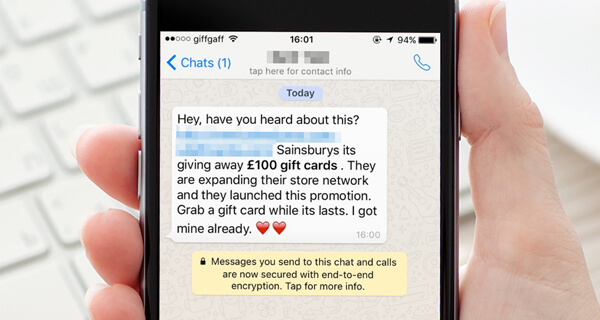
The fake WhatsApp messages appear as if they have been sent by someone in your contacts – such as a friend or family member.
However the recipient name is actually fake and is designed to trick you into clicking on the URL to claim the alleged Sainsbury's or Topshop voucher.
One example message reads: "Hey have you heard about this? Sainsbury's is giving away £100 gift cards (with a convincing looking link to a fake website). They are expanding their store network and they launched this promotion. Grab a gift card while it lasts. I got mine already”.
If you click on the convincing looking URL you will be taken to a fake website designed to trick you into handing over personal information.
According to security researchers, once you click on the malicious link fraudsters also collect personal information from your device by installing cookies on your phone that track you, or add browser extensions that can be used to show you advertisements.
Sainsbury's have confirmed that they are aware of the fake offers, and are "advising customers to delete the message".
How to protect yourself
- Install security software on your device and keep it up to date.
- Never click on unsolicited links in messages that you that receive, even if they appear to come from a trusted contact.
- Follow WhatsApp’s advice for staying safe whilst using the messaging service.
(Update 7th November 2017): We are also aware of Marks & Spencer, Tesco, Asda, Nike, Lidl, Aldi & even Singapore Airline variations being sent round too.
Earlier this year we warned that fraudsters where tricking WhatsApp users into downloading a fake version of “WhatsApp Gold” which infected Android devices with malware.
To report a fraud and cyber crime and receive a police crime reference number, call us on 0300 123 2040 or use our online fraud reporting tool.



